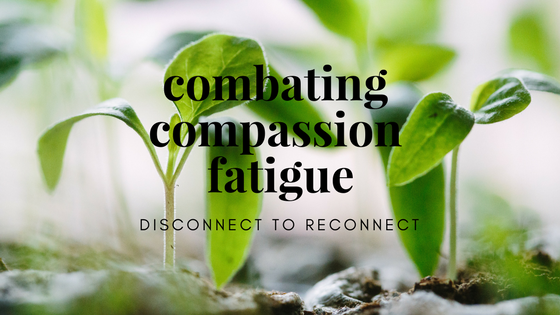Combating Compassion Fatigue: Disconnect to Reconnect

This week began with a tragedy. Thousands of people gathered for a concert in Las Vegas. Some had traveled on vacation to be there. Some were on dates. Some were on nights out with friends. Some had their children with them. They went to a music festival for fun, and it ended in chaos, fear, and devastation. The news has covered the aftermath of this awful event on an endless loop with terrifying images and video that transport the viewer to the very spot where dozens of people lost their lives and hundreds more were injured.
The videos are raw and gut-wrenching and difficult to turn away from. We don't even need to be in front of a television. They are on our computers and in our pockets whenever we get the urge to check. We watch, and we feel, and we watch, and we feel, and we get tired. We get tired of feeling the hurt and the anger and the sadness that has so often dominated the news in recent months. We are no strangers to tragedy, and in the age of social media, we don't have to look very far for an emotionally devastating event; however, this summer has been especially traumatic and widespread events. Between Charlottesville, hurricanes Harvey, Irma, & Maria, bombings and shootings in Europe, Las Vegas, and even local crime and we’re tired.
Even those of us who do not live near any of the places affected, it is likely that we have been to one of those places, know someone who was affected or displaced, or are only slightly separated from them. Maybe your mom’s best friend just went to Puerto Rico this summer, or your best friend from high school lives in Houston. We are all connected, so in watching others suffer, we all suffer. We may feel it is our duty to keep watching because we not only care about what has happened or is still happening, we also do want to ignore the suffering of others.
It is normal to feel overwhelmed, despondent, or even angry in the wake of yet another tragedy.
First responders, mental health professionals, doctors, nurses, social workers, and others who work closely with trauma survivors or who routinely respond to traumatic events may experience compassion fatigue. This is also referred to as secondary traumatic stress or trauma fatigue. This occurs when an empathy response, feeling the feelings of others, causes the professional to internalize the trauma of their patient or client after repeated exposure. So, for example, a therapist may have a patient who experienced a traumatic relationship that they are processing through therapy. The therapist listens to and may internalize the stories and emotions of the patient in a way that causes the therapist to experience trauma after the fact. Basically, the emotions of the carer are worn out.
Symptoms of compassion fatigue.
This may not happen all at once. It often creeps in on a person in ways that aren't noticeable at first. In the case of this summer, you may have felt heartbroken for every person, dog, cat, or horse you saw being rescued in Houston, but as the tragedies mounted, you may have begun to feel less and less as each new day brings a new event, or you may feel so overwhelmed by all of it that you have difficulty doing anything but watching as the next news cycle unfolds. Symptoms may include dissociation (or feeling disconnected from yourself), anger, anxiety, trouble sleeping, nightmares, emotional disturbances, or feeling overwhelmed, powerless, or on edge. Physical symptoms such as nausea, headaches, or dizziness may also surface. Although these symptoms are most common among trauma victims and those who respond to traumatic events through direct contact with survivors, no one is immune to the effects when surrounded by, what may feel like, continual tragedy. Parents may feel the effects more strongly as they try to filter information and explain tragic events to children.
In order to avoid the negative effects of compassion fatigue, it is important to acknowledge and name it. Often, simply taking a breath and noticing that you feel overwhelmed can be enough to start responding. The most effective way for a non-professional to address compassion fatigue is to limit exposure to the traumatic event or coverage of the events. While professionals are required as part of their jobs to continue exposure, a lay person is not. Turn off the television. Get away from social media. Connect with family and friends and other sources of strength. Engaging in self-care such as exercise, healthy eating, or other activities that give you a boost can protect you from disengaging emotionally or physically.
It is easy to get sucked into the endless news cycle of tragic events. Empathy with those who have suffered can cause feelings of disconnection from self and others as well as overwhelming emotions or even anger. Disconnecting from the news can help you reconnect with yourself and those around you so that you can avoid burning out.
For more information:
http://www.compassionfatigue.org/
https://www.psychologytoday.com/blog/somatic-psychology/201207/compassion-fatigue
https://www.goodtherapy.org/blog/the-cost-of-caring-10-ways-to-prevent-compassion-fatigue-0209167